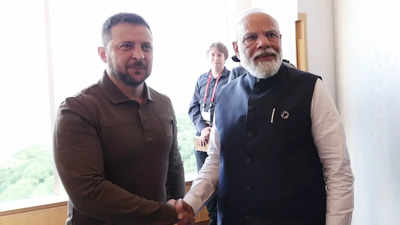Indian Prime Minister Narendra Modi emphasized the humanitarian dimension of the ongoing Ukraine conflict, stating that it is not merely an issue of economy and politics but a matter of humanity. During a meeting with Ukrainian President Volodymyr Zelenskyy in Hiroshima, Japan, PM Modi pledged India’s support for the resolution of the war, highlighting the significance of addressing the suffering faced by the Ukrainian people.
The meeting between PM Modi and President Zelenskyy marked their first in-person interaction since the Russia-Ukraine conflict erupted in February last year. They had previously engaged in several telephone conversations, with their last call occurring in December 2022, during which Zelenskyy sought India’s support for Ukraine’s 10-point peace plan announced at the G20 summit in Bali. Zelenskyy also recently reached out to PM Modi through a letter, requesting additional humanitarian aid and support at the United Nations.
A tweet from PM Modi’s official account showcased the leaders shaking hands and engaging in discussions alongside officials from both nations. Following the meeting, President Zelenskyy expressed gratitude for India’s backing of Ukraine’s territorial integrity and sovereignty, particularly at international forums, as well as for its provision of humanitarian assistance.
PM Modi has maintained regular contact with both President Zelenskyy and Russian President Vladimir Putin since the beginning of the conflict, demonstrating India’s effort to strike a delicate balance in its Ukraine policy. In a telephonic conversation with President Putin in December, PM Modi emphasized the importance of dialogue and diplomacy as the only viable paths forward. Their exchange occurred following their bilateral meeting in September 2022 during the SCO Summit, where PM Modi underscored the significance of democracy, dialogue, and diplomacy, stressing that the current era is not one of war.
India’s approach to the Ukraine conflict centers on fostering dialogue and diplomacy to bring an early end to hostilities. PM Modi has consistently called for an immediate cessation of fighting, even though India does not endorse the G7’s sanctions on Russia. By engaging with both sides, India aims to promote peaceful negotiations and contribute to resolving the conflict.
PM Modi’s visit to Hiroshima for the G7 summit marked the first leg of his three-nation tour, which includes Papua New Guinea and Australia. President Zelenskyy also attended the summit following an invitation by Japan, the current chair of the G7. Zelenskyy seized the opportunity to engage with leaders from the seven major developed democracies as well as representatives from invited developing nations, including India.
Overall, PM Modi’s recognition of the humanitarian aspects of the Ukraine conflict underscores India’s commitment to support efforts aimed at resolving the war. By advocating for dialogue and diplomacy, India seeks to contribute to a peaceful resolution that addresses the suffering of the Ukrainian people and upholds Ukraine’s territorial integrity and sovereignty.


